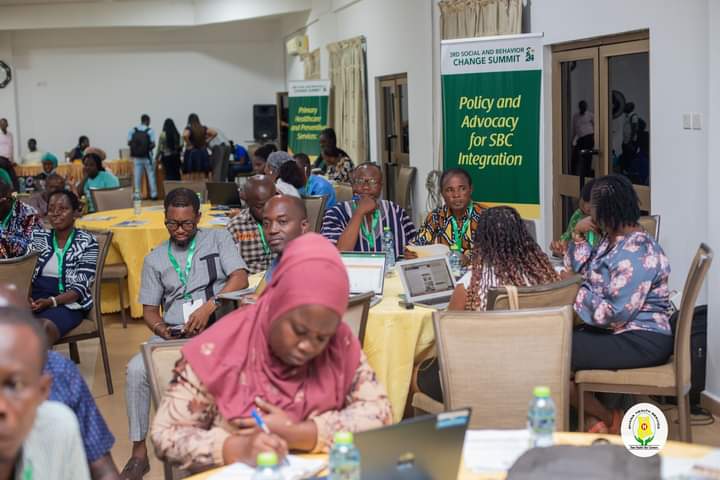By: Emmanuel Amoah
The Ghana Health Service has launched its three-day 3rd Social and Behavior Change (SBC) Summit, uniting key stakeholders to develop actionable strategies for achieving Universal Health Coverage (UHC).
The summit is designed to promote knowledge sharing and collaboration among participants committed to UHC, with a focus on equitable and sustainable approaches.
The event will feature innovative solutions aimed at enhancing the delivery of comprehensive health services, with a spotlight on community-led SBC initiatives that are making a significant impact on healthcare delivery.
The theme for this year’s summit is “Achieving Universal Health Coverage through Evidence-Based Social and Behavioral Change (SBC) Interventions,” highlighting the vital role of data-driven SBC strategies in advancing universal healthcare access.
In her opening remarks, Mrs. Mabel Asafo, the Acting Director, emphasized the crucial importance of SBC interventions. She noted that these interventions are key to shaping health behaviors, influencing policies, and ultimately improving health outcomes globally.
Mrs. Asafo stated that the summit would concentrate on evidence-based strategies, cutting-edge research, and exploring innovative solutions capable of transforming health systems. The objective is to ensure that no one is left behind.
She also highlighted the summit as a unique opportunity to form partnerships, develop actionable plans, and commit to driving meaningful change within participants’ spheres of influence.
In his keynote address, Dr. Patrick Kuma-Aboagye, Director-General of the Ghana Health Service, underscored that Universal Health Coverage (UHC) represents a symbol of equity and justice in global healthcare. UHC is founded on the principle that everyone, regardless of socio-economic status, should have access to essential health services without financial barriers.
However, achieving UHC involves more than just expanding healthcare access. It requires a holistic approach addressing both supply and demand in healthcare delivery. On the supply side, adequate infrastructure, trained personnel, and essential medical resources are necessary. On the demand side, it’s crucial to ensure that individuals and communities are aware of and motivated to use the available services.

At the heart of this effort are evidence-based SBC interventions, which play a critical role in driving sustainable health outcomes within the UHC framework. By utilizing data-driven insights, SBC strategies empower individuals and communities to adopt healthier behaviors, significantly reducing preventable diseases like malaria, hypertension, diabetes, tuberculosis, and diarrheal diseases.
Dr. Kuma-Aboagye stressed that achieving UHC is not solely the responsibility of the health sector; it requires coordinated and collaborative efforts across various sectors, including healthcare, education, and policymaking. Innovation is essential in these efforts, whether through technology to expand healthcare access or community engagement strategies that effectively connect with marginalized populations.
While the journey towards UHC is challenging—marked by financial constraints, infrastructural gaps, and socio-cultural barriers—it also presents significant opportunities. The global community has access to an unprecedented array of tools, knowledge, and resources to drive transformative change.
Dr. Kuma-Aboagye urged all stakeholders to commit to translating evidence into action by mobilizing resources, scaling up effective interventions, and advocating for policies that prioritize healthcare providers and the communities they serve. By doing so, UHC can become not just an aspirational goal, but a tangible reality for all.







